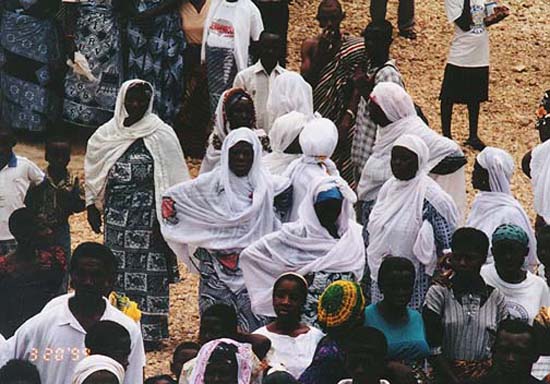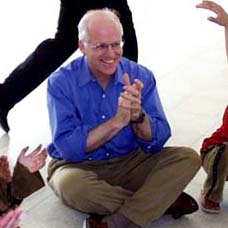
"The Peace Corps packing list will tell you to bring 100% cotton items. However, I disagree with that. I think cotton blend clothing is much much better. Cotton/lycra or cotton/spandex, for example. Remember that there are no washing machines, and you will be doing your laundry by hand. Cotton blends hold their shape better, and are easier to keep clean. Some people say pure cotton is cooler, but it is just *always* hot in Ghana, no matter *what* you wear!"
Peace Corps Ghana Wiki: Before you go
Before You Go
[edit]
What should I pack?
[edit]
Luggage
Luggage isn't particularly important. Once I reached my site and got unpacked, my luggage went into my closet and stayed there until I left. On the other hand, luggage can get moldy in storage, and airport handlers can be rough with it, so you probably shouldn't skimp on luggage, either. "Soft" luggage, such as a large backpack, might be a good idea.
Also, bringing along a good medium-sized rucksack is recommended. Something big enough for weekend trips, but no bigger.
Army duffle bags are good. Nothing can rip them and the loops at the top come together so that one full sized padlock can lock the whole thing.
Remember that any checked luggage is subject to search, and therefore any locks are at risk of being cut by security personnel if they need to examine your luggage when you're not around. It is therefore recommended to use only TSA-approved locks on your checked luggage. These locks are available in both key and combination types and allow TSA personnel to open them without cutting.
[edit]
Clothes
Try to bring as few clothes as possible. Slacks and button-down shirts can be tailor-made for you once you reach Ghana. The cloth in Ghana is lighter and more comfortable in tropical weather than most American clothing.
The Peace Corps packing list will tell you to bring 100% cotton items. However, I disagree with that. I think cotton blend clothing is much much better. Cotton/lycra or cotton/spandex, for example. Remember that there are no washing machines, and you will be doing your laundry by hand. Cotton blends hold their shape better, and are easier to keep clean. Some people say pure cotton is cooler, but it is just *always* hot in Ghana, no matter *what* you wear!
[edit]
Socks
Depending on what your job will be, socks may be very useful. If you're working outdoors in a rural setting, such as forestry, socks and boots are quite important. Walking around a tree nursery in sandals or flip flops is not recommended---too many snakes and uneven ground. Plus, the grass can be itchy.
On the other hand, some volunteers find socks too hot and wear sandals constantly.
Even if your job doesn't require walking around in the bush, you will probably want to bring plenty of socks. Teachers, for example, are expected to wear dress shoes and dress socks.
[edit]
Underwear
One volunteer highly recommends Jockey cotton. She says they never wore out during her three years of service. (Quite surprising; hand washing can be rough on clothes!)
Cotton is good because of the heat.
Quality underwear can be hard to find in Ghana. Consider bringing enough to last throughout your stay.
[edit]
Toiletries
Be prepared to use what's there. Although you can get a lot of Western brands in Accra, they are expensive.
Men, for example, can purchase a bar of local Ghanaian soap, lather it up, and use the suds for shaving. It's not necessary to buy or bring true shaving cream.
[edit]
Food
Besides the normal packing, bring some treats for yourself. Food choices are surprisingly limited here. "Surprisingly" because most areas of the country have 3 growing seasons, but the vegetables are pretty limited to tomatoes, cabbage, onion, garden eggs (somehow like eggplant, but not exactly), maize and okra. There are LOTS of fresh fruits, however.
[edit]
Kitchenware
Tupperware and Ziploc bags are very useful. Don't go overboard, though: Consider shipping yourself a box of kitchen supplies to minimize how much you have to carry.
The Peace Corps Ghana Welcome Book suggests bringing a frying pan, but don't pack one unless you really feel it's necessary. Frying pans are big and heavy!
[edit]
Electronics
[edit]
Electricity
Make sure anything electronic that you bring can operate on 220 volts of current (or on batteries). Note that batteries in Ghana are either very expensive or don't last very long, so if you're planning to bring battery-operated electronics, consider bringing rechargeable batteries and charger with you, as well. Again, remember that the charger must be compatible with 220 V.
Don't worry about plug adapters; you can easily purchase the right ones cheaply almost anywhere in Ghana. The British Type 3 plug is by far the most common, but you will also find the Europlug.
[edit]
Cameras
Digital cameras are fine, especially if you also bring a laptop for storing pictures. (Remember to make backups in case of theft or hard drive failure!)
However, printing digital camera photos is a bit of a challenge. (Techiman reportedly has at least one print shop that can print digital photos.)
[edit]
Alarms
Volunteers often travel by bus, but their communities might see only one bus per day, which usually leaves not long after sunrise and fills up quickly. You might find yourself having to get up at 4 AM just to make sure you get a seat out of town. That's why alarm clocks (or at least a good watch with a loud alarm) are very helpful. They're small and easy to pack, too.
Remember, though, that bringing an alarm clock means bringing one more item to find batteries or an electrical outlet for. Some volunteers simply rely on the sun, the chickens, the people, the calls to prayer, and other disturbances that happen routinely at dawn.
[edit]
Flashlights
Some volunteers absolutely love headlamps. In addition to helping light the way at night, they're great for reading, too.
[edit]
Entertainment
[edit]
Music
Music is always nice to have. CD players are good; iPods are better.
Electricity can be iffy (if you even have some at your site), so you might want to bring an extra battery for your iPod.
[edit]
Movies
Consider bringing a few DVDs with you to donate to the collection in the Peace Corps Ghana sub-offices.
If you bring a laptop, the ability to play DVDs is a nice luxury. A portable DVD player is also an option. In either case, make sure your equipment can also read VCDs, which are quite common in Ghana.
[edit]
Books and Magazines
Bring a few books, but send the rest using M-Bags before leaving for Ghana. They will take around four months to get to Accra. Don't send any that you'd want to keep for good; you probably won't want to lug them back to the U.S. anyway. Instead, consider donating your stash to the Peace Corps Ghana sub-offices.
Some volunteers have magazine subscriptions, but remember that everyone gets a free subscription to Newsweek.
[edit]
Gifts
As part of your training, you will be paired with a host family to help you learn about Ghanaian customs and manners. It's customary to bring a gift for your family, so here are some suggestions:
* Consider some children's backpacks. Many children are not allowed to take their books home from school to study with unless they have a backpack. People often ask for these.
* Pens and pencils are good to give away and easy to pack. Those "gel" pens go over really well with kids.
* A hardcover book of photos of famous American landmarks or scenes from your hometown
* Simple, cheap, unbreakable toys for your host family's kids, such as a Frisbee
* Fanny packs seem to go over well with host families
* T-shirts and hats with American themes
* Cheap ($20) watches such as the Timex Expedition. (The watches available in Ghana are even cheaper and usually very poor quality.)
* Ghanaians sometimes ask for "American" bibles.
* Card games such as Uno or Go Fish
* For the host mom: perfumes, lotions, good-quality dish towels
If you can't decide what to give your soon-to-be Ghanaian friends, almost anything that you can't get in Ghana would be appreciated.
Even if you decide on a gift, it's a good idea to bring along lots of pictures of you and your family, as well.
[edit]
Miscellaneous
A small spray bottle can be surprisingly helpful. You can fill it with water and spray it on your clothes to make the wrinkles fall out. It works so well, you might not even need an iron! You can also use it on your hair in the morning to get the bedhead out. Good spray bottles can be found in the travel section of a drugstore where they sell small sized toiletries, and if they don't have empty ones for sale, just buy some hairspray and refill it with water. If you have extra room in your bag, a large one works great, but the small one is better for traveling around Ghana.
The Bradt Ghana Travel Guide is helpful even if you don't plan on traveling throughout Ghana. It's so detailed that it probably has tips for your site! One volunteer, who had served in a small town in the Upper West Region, didn't learn of a nearby wildlife sanctuary until he returned from his two years of service and read about his site in the Guide.
[edit]
How do I mail myself something?
Sometimes it is better to mail yourself certain items instead of trying to take them with you on the flight to Ghana. If you are a voracious reader, for example, it may be cheaper and easier to send a box of books by surface mail than to check them with your luggage.
To mail yourself something, you basically have two options:
1. Send the item to the Peace Corps office in Ghana. The office has a mailroom that will hold your package until you come to collect it. In fact, when Peace Corps officers make a routine visit to your site, they usually bring along any of your mail so you may not even need to make the journey to Accra. During training, this is usually about once a week. If you are sure the package will arrive during your training, send it to the Peace Corps Accra address, and prefix your name with "PCT" so they know where to send it. After training, you can also send packages to the Peace Corps suboffices in Kumasi and Tamale, in addition to the main office in Accra.
2. Send the item to yourself at your site. For volunteers in the northern regions, trips to Accra are rare, and it is sometimes faster and more convenient to have a package delivered directly to your site. Note, however, that getting packages through local customs offices can sometimes be a pain.
If you want to send yourself something directly but don't yet know the location of your site, you can simply leave the package (and some money for shipping) with a friend or relative. A few weeks later, when you know the location of your site, you can relay the address and have them ship the package to you.
Note that airmail to Ghana is fast (usually less than two weeks) but very expensive. On the other hand, surface mail is much cheaper but far slower. Packages sent by surface mail have been known to take six months or more before arriving in Ghana. One volunteer has reported that a package was delivered three years after it was sent.
Be careful when packing food. Any chocolate or similar products are likely to melt. Also, you should not take individually-wrapped items (such as snacks) out of their boxes. This will help mice or other vermin obtain your food for themselves. Nothing is as frustrating as getting a huge box with a little hole on the outside and seeing lots of crumbs and empty wrappers on the inside.
















